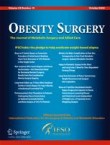
Abstract
Introduction
While body image can improve following bariatric surgery, a portion of patients continue to experience concerns about weight and shape regardless of weight lost. Research is needed to identify risk factors for post-surgical weight and shape concerns given that body dissatisfaction may contribute to poor outcomes.
Aims
To evaluate whether (1) change in weight-related self-esteem and symptoms of depression from pre- to 12-month post-surgery were associated with change in weight and shape concerns independent of weight-loss; (2) improvement in weight and shape concerns, symptoms of depression, and/or weight-related self-esteem predict greater weight-loss 12 months after bariatric surgery; and (3) improvements in weight-related self-esteem, symptoms of depression, weight concerns, or shape concerns predict weight loss.
Methods
Fifty adults approved to receive bariatric surgery self-reported body mass index and completed validated measures of weight-related self-esteem, symptoms of depression, and weight and shape concerns pre- and 12-month post-surgery.
Results
Improvements were observed for weight-related self-esteem, concerns over shape and weight, symptoms of depression, and body mass index from pre- to 12-month post-surgery. Improvement in weight-related self-esteem was associated with concomitant improvements in concerns over shape and weight, independent of weight loss. Improvement in symptoms of depression was associated with improvement in concerns over weight, but not shape. Finally, exploratory analyses indicated that improvements in weight-related self-esteem, and concerns over shape and weight, but not symptoms of depression were associated with improvement in weight-loss.
Conclusions
Weight-related self-esteem may represent an overlooked and important target throughout the bariatric surgery process that could enhance surgical outcomes.



Δεν υπάρχουν σχόλια:
Δημοσίευση σχολίου
Σημείωση: Μόνο ένα μέλος αυτού του ιστολογίου μπορεί να αναρτήσει σχόλιο.